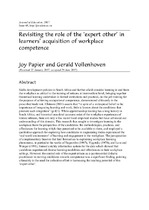Revisiting the role of the ‘expert other’ in learners’ acquisition of workplace competence
Abstract
Skills development policies in South Africa and further afield consider learning in and from
the workplace as critical to the training of artisans at intermediate level, bringing together
theoretical learning undertaken in formal institutions and practical, on-the-job training for
the purpose of achieving occupational competence, demonstrated ultimately in the
prescribed trade test. Ellstrom (2001) asserts that “in spite of a widespread belief in the
importance of integrating learning and work, little is known about the conditions that
promote such integration” (p.421). While apprenticeship training has a long history in
South Africa, and historical anecdotal accounts exist of the workplace experiences of
trainee artisans, there are only a few recent local empirical studies that have advanced our
understanding of this domain. This research thus sought to investigate learning in the
workplace from the perspective of the candidates: the methodologies, practices, and
affordances for learning which they perceived to be available to them, and employed a
qualitative approach for exploring how candidates in engineering trades experienced the
‘real world environment’ of learning and engagement in the workplace. The juxtaposition
of complementary theories that lent themselves to explaining workplace learning
phenomena, in particular the works of Engeström (1987); Vygotsky (1978); and Lave and
Wenger (1991), formed a richly informative system for the data which showed that
candidates experienced diverse learning modalities and affordances in their workplace
settings. However, the central role of the expert artisan as a quintessential didactic
practitioner in moving candidates towards competence was a significant finding, pointing
ultimately to the need for collective effort in harnessing the teaching potential of this
‘expert other’.

